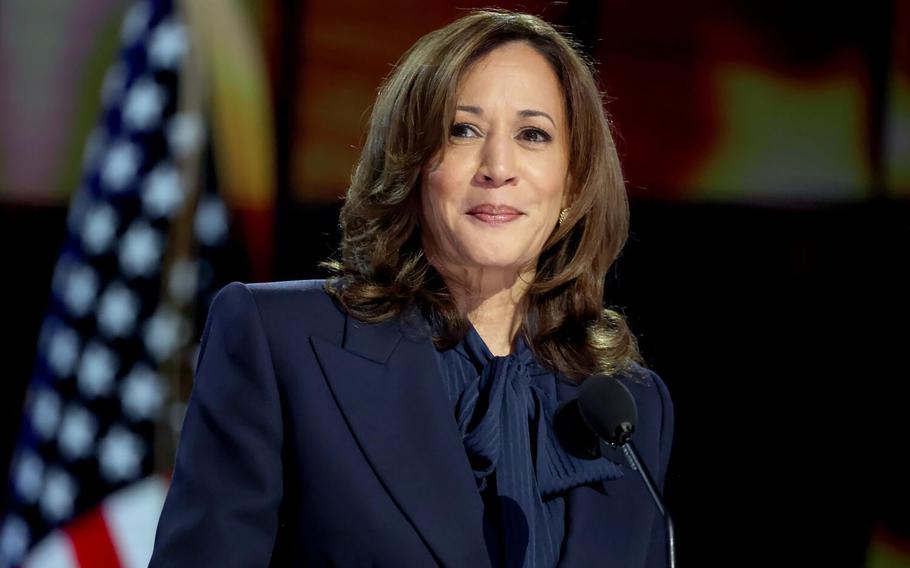
Kamala Harris speaks at the Democratic National Convention in Chicago on Aug. 22, 2024. (Robert Gauthier, Los Angeles Times/TNS)
(Tribune News Service) — Kamala Harris is betting that Americans don’t want an all-out confrontation when they tell pollsters they’d like their leaders to get even tougher on China.
Faced with polling that says most Americans believe confronting China should be a top foreign policy priority, Harris’ campaign messaging suggests that while she won’t go easy on China, there’s no upside in a greater rupture between the world’s two biggest economies. That contrasts with her rival Donald Trump, who’s argued for 60% tariffs on Chinese imports.
Vice President Harris has been part of efforts to “responsibly manage the competition with China,” her top foreign policy aide, Phil Gordon, wrote in a note soon after President Joe Biden stepped down from the race. In keeping with Harris’ scant policy platform so far, the note didn’t mention tariffs at all.
Instead, the note to national security professionals highlighted Harris’ meeting with President Xi Jinping in November 2022 in Bangkok “to make clear we needed to maintain open lines of communication so that competition does not veer into conflict.”
To followers of Biden’s China policy, the phrasing will be familiar. Harris is expected to stay the course in confronting China on matters of semiconductor technology, tensions over Taiwan and territorial disputes in the South China Sea. An aide to the vice president, who asked not to be identified, said she’d continue her work countering Chinese efforts to undermine global stability.
Harris has barely mentioned China since stepping into the race. She made a glancing reference at the Democratic convention, pledging to ensure “America, not China, wins the competition for the 21st century.” The world’s No. 2 economy didn’t feature in her first major interview since topping the ticket, with CNN on Thursday night.
The Democratic nominee would likely take a “more tailored approach” to tariffs than Trump, according to Jennifer Welch, who previously advised Harris on Asia and is now Bloomberg Economics’ chief geo-economics analyst.
“A potential Harris administration is more likely than a potential second Trump administration to retain key aspects of Biden’s approach to China,” she said.
It’s a strategy that could be tested quickly. U.S. officials have grown concerned over China’s push to expand its nuclear-weapons arsenal. They’ve also sounded the alarm with greater urgency over Beijing’s support for Russia’s war effort in Ukraine. Harris hasn’t said what she’ll do about TikTok, the Chinese-owned video-sharing app that Congress voted to ban — though she did join it.
The problem for Democrats is that voters favor Trump’s approach over Biden’s. The former president has tapped — and critics say encouraged — a deep wellspring of animosity toward China. Biden carried on some of Trump’s policies, declining to lift the tariffs he imposed during his term.
That tracks with a bipartisan consensus in Washington. In two weeks, the House of Representatives will hold “China Week,” which will see the introduction of bills meant to impose a series of fresh curbs on the country.
Harris’ work as a senator saw her co-sponsor bills related to alleged human rights abuses in Hong Kong and China’s far western region of Xinjiang. If she returns to those sensitive matters, ties could falter, according to Cui Hongjian, a professor at Beijing Foreign Studies University and a former Chinese diplomat.
Tensions spanning such a wide range of issues is one reason Biden is likely to become the first president since Jimmy Carter not to visit China during his term. Even so, he’s sought to pull back from a total rupture in relations.
That message of stability was highlighted this week when Biden’s national security adviser, Jake Sullivan, sought to send a dual message about Harris when he met top Chinese leaders in Beijing. The senior White House official touted her deep involvement in China issues, while sending Beijing an implicit warning against trying to take advantage of her supposed lack of experience.
With just over two months left until the election, Sullivan also signaled Harris would endorse the Biden administration’s plan to keep talking with China.
“Vice President Harris has been a central member of the Biden foreign policy team,” Sullivan said. “She’s had the opportunity to engage herself with President Xi and with Premier Li, so she is known to both of the top leaders in China.”
In another sign, Harris has picked Tim Walz as her running mate, someone with rich experience working in the Asian nation. Meanwhile, Gordon’s memo highlighted that Harris had visited the Indo-Pacific region four times and dedicated “significant time and energy” to strengthening alliances there.
“The fact that Harris spent a lot of time in Asia says something about her China strategy,” said Jacob Stokes, a senior fellow at the Center for a New American Security think-tank who advised Biden on Asia policy when he was vice president. “There is an old axiom that the best China strategy is a good Asia strategy.”
Jenny Leonard, Michelle Jamrisko and Colum Murphy contributed to this report.
©2024 Bloomberg LP
Distributed by Tribune Content Agency, LLC